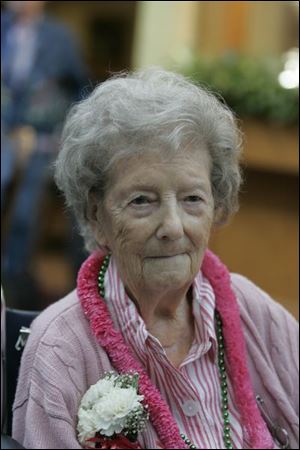
West Toledo centenarian poetry fan attributes her health, longevity to 'necessity'
3/29/2007
Margaret DeMars celebrates her 100th birthday surrounded by friends, family, and well-wishers, including Mary Sweeny of Perrysburg and her children Ryan, 6, and Kayla, 9.
Margaret E. DeMars, who turned 100 on Sunday, has lived longer than all the men in her life. A lifetime longer.
She said her longevity was a necessity.
"I had to raise my family on my own, so I probably thought I should live, that I had to live to take care of them," she said.
She had three children - two sons and a daughter. Her husband, George, who worked at Dana Corp., died in his early 50s of a cerebral hemorrhage.
When he died, their children, along with their grandchildren, were still living at home with them in West Toledo.
"I didn't have it easy at all, because he died and left Mom with the kids to raise," she said.
She moved to Toledo soon after graduating from high school in her hometown of Terre Haute, Ind., which sits along the Wabash River about 75 miles west-southwest of Indianapolis.
Mrs. DeMars' two sons, Jerry and Terry, died six months apart in the late 1960s, just a few years after their father had passed away.
Jerry died in a sprint car racing accident, and Terry was hit by a car right after returning from the Vietnam War - "he didn't die there he came home and died," recalled Mrs. DeMars' granddaughter, Leslie Zubkoff, who was in second grade at the time.
Mrs. DeMars' one living child, Susan, has four children and there are now 10 great-grandchildren and two great-great-grandchildren.
Because of family conflicts, Mrs. DeMars ended up raising Mrs. Zubkoff, now 46, on her own.
Her granddaughter, who lives in Erie, Mich., is now returning the favor.
Mrs. Zubkoff moved her grandmother to the Aspen Grove Assisted Living in Lambertville so that they could remain close. She visits her grandmother almost every day.
"She couldn't be any better than she is she is precious," Mrs. DeMars said of her granddaughter.
"I took her and raised her. I didn't have to, but I did. And she lived with me all her life until she got married."
Mrs. Zubkoff said her grandmother once gave a neighbor who had just lost her 21-year-old son some advice on dealing with the grief:
"She told the neighbor that she now has something in common with Mary, the mother of our Lord, and she said that [knowledge] is what had gotten her through it [when she lost her sons]."
A strong Roman Catholic, Mrs. DeMars' mother was Irish and her father was Irish and English.
She was one of eight children in Terre Haute, and they didn't grow up easy.
"They would go out to the train tracks with a baby buggy and put coal in it," Mrs. Zubkoff recalled, from old stories her grandmother once told her.
"If the engineers saw, they knew what the kids were doing and why, and would toss them big hunks of coal from the trains to help."
But despite all the hardships of her life, Mrs. DeMars kept moving forward, for a century.
Perhaps it was her love for poetry that supported her along the way.
Despite her memory being selective at times, she can still recite hundreds of lines of poetry.
"I love poetry," she said. "It's like a song, it has a rhyme."
Last week, on a quiet afternoon in the library of the senior center, she began to recite Henry Wadsworth Longfellow's poem "Paul Revere's Ride" :
"Listen my children and you shall hear
Of the midnight ride of Paul Revere,
On the eighteenth of April, in Seventy-five;
Hardly a man is now alive
Who remembers that famous day and year."
Mrs. DeMars does remember things from her days and years, including ice wagons - horse-drawn wagons that delivered ice door to door for families' ice boxes.
"They sold big bags of ice - 25 to 50 pounds. Me and other kids would jump up on the wagon and grab chunks of ice that had fallen off."
The larger the ice block, the longer a family's meat would stay fresh.
She also remembers Prohibition well. It ended when she was 26.
"Oh, they had beer in my day. You waited until you got home until you opened your bottle," she said.
Mrs. Zubkoff said her grandmother had wanted her to bring some green beer for St. Patrick's Day, "but it didn't mix with her medication."